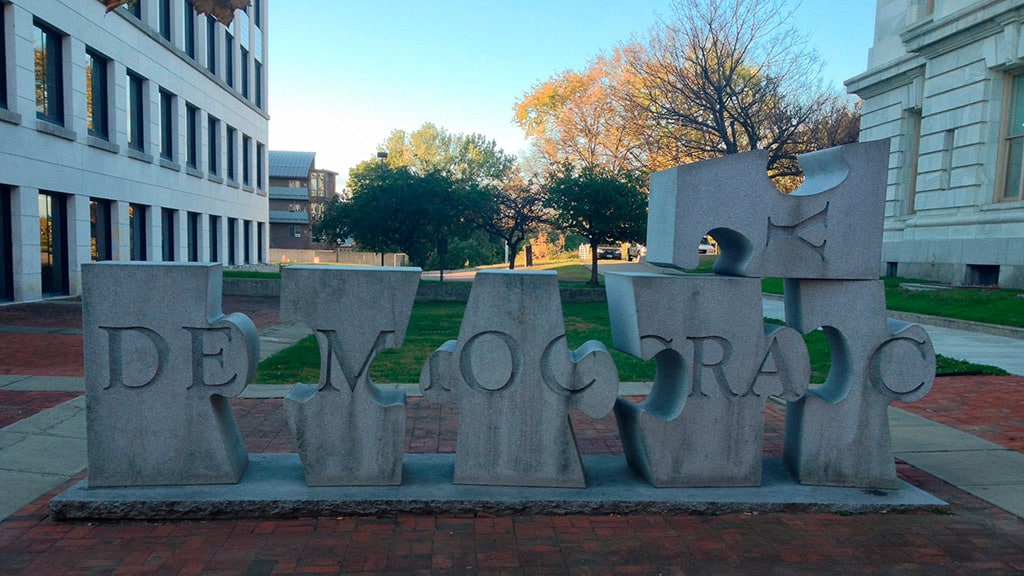
For some years now democracies in general have experienced tough times, and the best illustration is Donald Trump’s attempt to cling on to the White House despite having lost the election to Joe Biden. The insurrection, involving a brutal assault on the Capitol by a mob incited by Trump himself, caused consternation not only in the US but also in Europe. Trump’s efforts to thwart Congress, after judges and legislatures in various states had tried to frustrate ratification of Biden’s election, have failed. The institutions have worked, but a considerable number of Trump voters continue to believe, like their leader, that the election was rigged. In such circumstances, the idea of an international Summit for Democracy takes on more urgency, although not necessarily effectiveness.
The Summit for Democracy is one of the keynote projects for the first months of Biden’s term. He proposed it back in 2018, as an ordinary citizen, and later on the campaign trail. What has befallen the US lends it additional importance, while at the same time depriving it of credibility. According to an article setting out his possible foreign policy agenda, written by the man who is now the President elect, its goal is ‘to renew the spirit and shared purpose of the nations of the free world’. It is a means of competing ideologically with China and Russia, and of strengthening Western democratic influence on the governance of international institutions. For his part, Xi Jinping has reacted by referring to a ‘community of common destiny for mankind’. Biden’s initiative may be attractive on paper, but it raises a number of questions without resolving many of the world’s problems which, if they are to be tackled, let alone resolved, require undemocratic countries to be involved.
One tricky issue will be who, and who not, to invite to the summit, which is theoretically for Democracy, not of (liberal) democracies. Some perceive themselves to be democrats because they win elections, but then go on to govern like autocrats, such as Erdoğan in Turkey, or an even bigger headache for the US, Modi and his India with its membership of the BRICS, not to mention the behaviour of Trump himself and a significant portion of his followers. There will be a price, a commitment, to pay for being invited to this summit or this new club. Because some –it seems that the idea emanates from London, in its attempt to find its place in the world post-Brexit– speak of forming a Group of Ten, a G10 or a D10 of democracies, which would be the G7 (the US, Canada, Germany, France, Italy, the UK and Japan) plus India, South Korea and Australia. No African or Latin American countries –and no Spain?–. Others talk of a D20 or more. There is no space for the EU as a bloc, because it contains such ‘illiberal’ democracies as Hungary and Poland. The project seems at odds with the fact that Macron has awarded the French Legion of Honour to the Egyptian dictator, Sisi. Or that the EU has signed an investment deal with China in the same year that Beijing withdrew the few remaining freedoms that Hong Kong still enjoyed. This highlights the contradictions that exist between values and interests, including the growing capacity for European strategic autonomy, which has to include a component of defence and democratic renewal.
In fact, when she was the US Secretary of State, Madeleine Albright –in the unipolar world era in which she described the US as the ‘indispensable nation’– launched a Community of Democracies that continues to exist, although it has not made much impact. NATO is often cited as an organisation of democracies, overlooking the fact that it once numbered among its members Greece under the colonels and the Turkish dictatorship, and these days the various suspects noted above. France and Germany launched something different in 2019, an informal Alliance for Multilateralism, which does include Spain. All these projects have a tendency to overlap, although in the latter there are illiberal regimes such as Singapore.
As so many surveys, rankings and analyses point out, democracy is on the back foot and experiencing a lack of support in many democratic countries. Perhaps the Biden initiative will serve to strengthen the idea of democracy, starting with the US itself, where, as noted, the system has worked but major failings and dangers have come to light. Even if external support is sought, defending, fixing and improving democracy starts at home. It stems from uniting, or reuniting, reconnecting, politics and the economy with social fairness, with the fight against an inequality that has proliferated ubiquitously, and to which democratic systems must respond if they are not to founder, as might have happened under Trump. Democracies have to compete in the areas of social cohesion and solving problems, including overcoming polarisation and the rhetoric of hatred, which have been getting worse and not only in the US.
For the sake of their wellbeing democracies also have to confront the challenge of misinformation, especially at times of elections. Some national, regional and local governments –in the US, France, the EU and Indonesia, among others– have started to look at the need for the big social media operators (such as Facebook, Twitter and Google) to take responsibility for the misinformation that circulates on their platforms; although it is not only such media that spread misinformation, and the US, in the guise of its President of recent years, has had in its very own Great Misinformer. The fact that Trump has temporarily been banned from Twitter, Facebook and Instagram because of the events on Capitol Hill is not enough. His messages have continued circulating.
These days, the defence of democracy is intimately linked to the technology used by governments and corporations to control citizens. Francis Fukuyama and others have written about ‘how to save democracy from technology’ (they also have other big US tech firms in their sights). It is a concern that is very much to the fore in the European Commission’s proposals. In reality an Alliance of Democracies could amount more to an alliance against techno-autocracies and more specifically against Chinese technology, which is what lies at the heart of current geopolitical rivalry. The Economist, in line with certain think tanks, suggests the creation of a ‘technology alliance’, not based on any treaty. For London the D10 would also be an alliance for 5G communications, avoiding reliance on Chinese equipment.
Biden’s idea would also furnish liberal democracies with a more global outlook, such as the one China has with its new Silk Road, also known as the Belt and Road Initiative; this is something that has been jointly mooted by the analyst Robert Kagan and by Tony Blinken, who is set to become Biden’s Secretary of State. Moreover, credibility must be secured domestically for democracy to earn it abroad.
The world faces problems now such as the mass roll-out of vaccines against COVID-19, climate change, the Middle East, a new nuclear deal with Iran and another with North Korea, to name just a few, requiring the active contribution of China, Russia and other autocracies. Democracies will have to cooperate with dictatorships and illiberal regimes; also in order to prevent the United Nations, which ought to be in the interests of all, from falling into irrelevance. But the initiative will prove positive if it succeeds in triggering a debate, in the midst of a healthcare, economic and social crisis, about how to renew and broaden democracies and make up for a lack of reforms, some of them constitutional, that are long overdue. But this will require rather more than a summit.


